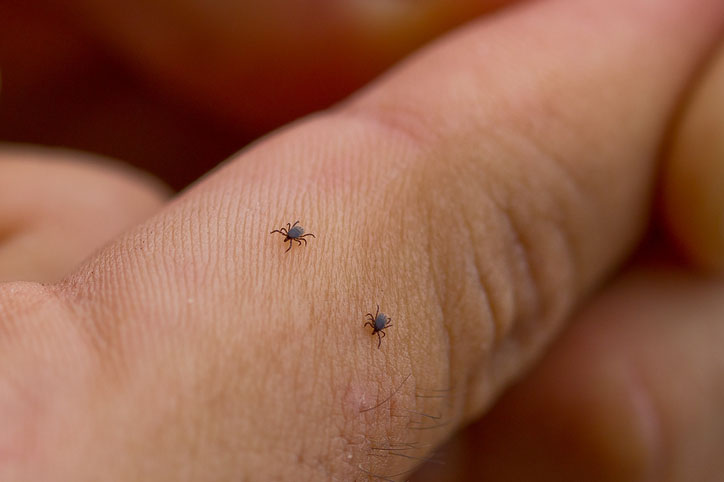Toxoplasmosis in Dogs
- Disorders Affecting Multiple Body Systems of Dogs
- Introduction to Disorders Affecting Multiple Body Systems of Dogs
- Congenital and Inherited Disorders Affecting Multiple Body Systems of Dogs
- Actinobacillosis in Dogs
- Actinomycosis in Dogs
- Amyloidosis in Dogs
- Anthrax in Dogs
- Botulism in Dogs
- Canine Distemper (Hardpad Disease)
- Canine Herpesvirus
- Ehrlichiosis and Related Infections in Dogs
- Enterotoxemia in Dogs
- Fungal Infections in Dogs
- Glanders (Farcy) in Dogs
- Infectious Canine Hepatitis
- Leishmaniosis (Visceral Leishmaniasis) in Dogs
- Leptospirosis in Dogs
- Lyme Disease (Lyme Borreliosis) in Dogs
- Melioidosis in Dogs
- Neosporosis in Dogs
- Nocardiosis in Dogs
- Peritonitis in Dogs
- Plague in Dogs
- Rocky Mountain Spotted Fever (Tick Fever) in Dogs
- Salmon Poisoning Disease and Elokomin Fluke Fever in Dogs
- Tetanus in Dogs
- Toxoplasmosis in Dogs
- Trichinellosis (Trichinosis) in Dogs
- Tuberculosis in Dogs
- Tularemia (Rabbit Fever) in Dogs
Also see professional content regarding toxoplasmosis.
Toxoplasmosis is caused by Toxoplasma gondii, a protozoan parasite that infects humans and other warmblooded animals. It is found worldwide.
Felines (members of the cat family) are the only definitive hosts of the parasite. Both wild and domestic cats serve as the main reservoir of infection. In dogs, a generalized infection may occur as the parasites travel through the body and invade the tissues.
Adult animals with vigorous immune systems control the spread of the parasite efficiently; therefore, toxoplasmosis usually causes no signs in healthy dogs. However, in puppies, the parasites may spread throughout the body. Signs of infection include fever, diarrhea, cough, difficulty breathing, jaundice, seizures, and death. Adult animals with weakened immune systems are extremely susceptible to developing sudden, generalized toxoplasmosis.
In many cases, treatment is not necessary. If warranted, your veterinarian will prescribe antibiotics to treat toxoplasmosis. Anticonvulsant medications may be used to control seizures. Fluids or other medication given by intravenous injection may be necessary for animals that are dehydrated or severely debilitated due to the infection.
Transmission of toxoplasmosis to people is an important problem. In some areas of the world, as much as 60% of the human population has antibodies to the organism and are likely to be persistently infected. Toxoplasmosis is a major concern for people with weakened immune systems. In these individuals, toxoplasmosis usually affects the nervous system and results from the emergence of T gondii from tissue cysts located in the brain as immunity wanes rather than from primary T gondii infection. Toxoplasmosis is also a concern for pregnant women because the organism can migrate across the placenta and cause birth defects. Infection may occur after eating undercooked meat or accidental consumption of cysts from cat feces. To prevent infection, people handling meat should wash their hands thoroughly with soap and water after contact, and also thoroughly wash all cutting boards, sink tops, knives, and other materials. The organism present in meat is killed by contact with soap and water. They can also be killed by exposure to extreme cold or heat. Tissue cysts in meat are killed by heating the meat throughout to 67°C (152.6°F) or by cooling to −13°C (8.6°F). Toxoplasma in tissue cysts are also killed by exposure to gamma irradiation. Meat of any animal should be cooked to 67°C (152.6°F) before consumption, and tasting meat while cooking or while seasoning should be avoided. Pregnant women should avoid contact with cat litter, soil, and raw meat. Pet cats should be fed only dry, canned, or cooked food. The cat litter box should be emptied daily, preferably not by a pregnant woman. Gloves should be worn while gardening. Vegetables should be washed thoroughly before eating, because they may have been contaminated with cat feces.
- Disorders Affecting Multiple Body Systems of Dogs
- Introduction to Disorders Affecting Multiple Body Systems of Dogs
- Congenital and Inherited Disorders Affecting Multiple Body Systems of Dogs
- Actinobacillosis in Dogs
- Actinomycosis in Dogs
- Amyloidosis in Dogs
- Anthrax in Dogs
- Botulism in Dogs
- Canine Distemper (Hardpad Disease)
- Canine Herpesvirus
- Ehrlichiosis and Related Infections in Dogs
- Enterotoxemia in Dogs
- Fungal Infections in Dogs
- Glanders (Farcy) in Dogs
- Infectious Canine Hepatitis
- Leishmaniosis (Visceral Leishmaniasis) in Dogs
- Leptospirosis in Dogs
- Lyme Disease (Lyme Borreliosis) in Dogs
- Melioidosis in Dogs
- Neosporosis in Dogs
- Nocardiosis in Dogs
- Peritonitis in Dogs
- Plague in Dogs
- Rocky Mountain Spotted Fever (Tick Fever) in Dogs
- Salmon Poisoning Disease and Elokomin Fluke Fever in Dogs
- Tetanus in Dogs
- Toxoplasmosis in Dogs
- Trichinellosis (Trichinosis) in Dogs
- Tuberculosis in Dogs
- Tularemia (Rabbit Fever) in Dogs





